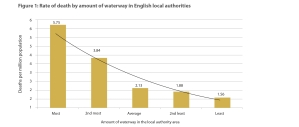RoSPA National Water Safety Seminar.
The Lowry, Salford Quays – Manchester, October 17
The July heat-wave saw a large number of drowning events occur in the UK, with open water looking more inviting than ever – and it’s hidden risks less apparent.
This sadly predictable spike in this year’s figures continues to pose the question: what is the most effective way to address the UK’s current drowning problem?
Seminar delivers call to action
This year’s RoSPA National Water Safety Seminar, takes place on October 17, and sees the launch of the UK’s first water safety and drowning prevention strategy.
An essential first step to turning the statistics around, the first public presentation of the new strategy will be delivered at the seminar by NWSF Chair, Michael Vlasto OBE, and RLSS UK Chief Executive, Di Standley.
Looking at the sources of the UK’s 400 annual drowning-related fatalities, the presentation will deliver a call to action, showing how we can collectively band around it’s ideas to each play a valuable part in driving change and saving lives.
Analysing WAID data and behaviour
The last two outings of the popular event have seen updates on the development of the WAID Database. With enough data now collected to enabling meaningful comparison and insight with other sectors, this year’s seminar will hear how WAID data can be used to produce risk evidence in support of safety strategy.
Other key research and updates will also feature, making the a ‘must attend’ event, with content relevant to all water safety environments.
Early discount rates for the event expire on September 5, 2013 with additional discounts available to RoSPA Members and National Water Safety Forum Members. View the programme here.



You must be logged in to post a comment.